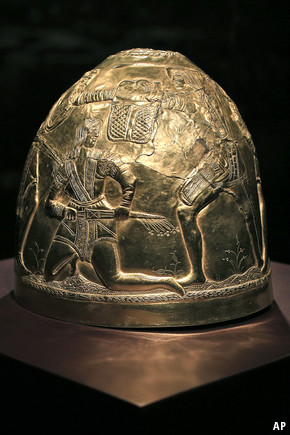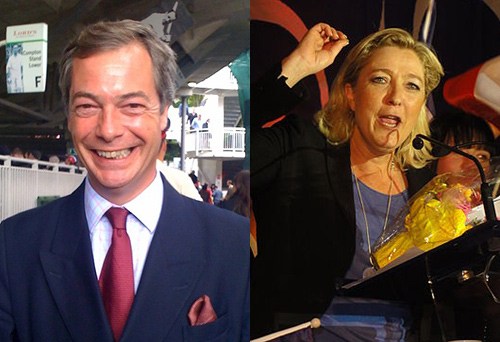
Armenia’s strategic U-turn
April 22, 2014
Culture wars in Ukraine
April 22, 2014What was described to us as a simple trade deal…. has been revealed as a smokescreen to cover a plan to create a huge superstate — the European Union.
“British sovereignty is mainly in their head because they’ve signed the EU Treaty.” — Viviane Reding, EU Commission Vice President.
Imagine if you will, that the U.S., Canada and Mexico signed up to what citizens believed was simply a new trade deal.
A few decades later, you are shocked to discover that a vast amount of laws affecting your life aren’t made by your elected officials in Washington, but in a new multi-million dollar Parliament Building in Ottawa, Canada.
When you ask the officials there what precisely is going on, they answer that the plan all along was to merge the U.S., Canada and Mexico into a single nation, with a single flag, anthem and currency.
If this scenario sounds bizarre, in Europe that is precisely what has taken place.
Decades ago, the nations of Europe signed up to what was described to us at the time as a simple trade deal.
In recent years, this trade deal has been revealed as the smokescreen to cover a plan to create a huge superstate — the European Union.
The European Union has its own unelected government, the European Commission; a vast Headquarters in Brussels; a “national anthem,” Beethoven’s “Ode to Joy”; and its own flag, the blue flag with the circle of yellow stars. In short they are trying to create a country called “Europe”.
There is only one democratic aspect to the EU, which is the European Parliament. However this chamber does not create new laws, it merely amends and scrutinizes new legislation.
The elected representatives there (Members of the European Parliament, commonly referred to simply as MEPs) are predominately in favour of the grand project and have been quiet about the true aims of the project.
As the superstate reaches completion, its architects have felt confident enough to let the truth be known.
EU Commission Vice-President Viviane Reding boasted during a recent trip to London: “The most powerful parliament in Europe is the European Parliament. Seventy per cent of laws in this country are co-decided there. British sovereignty is mainly in their head because they’ve signed the EU treaty.”
And during a trip to Sweden she proudly stated: “Did you know that 80% of Swedish laws are not Swedish laws? They are European laws that have been translated into Swedish legislation.”
These claims have rightly shocked the people of Europe — and now that the European master plan is out in the open, they are worried that they are losing democracy and national sovereignty.
In May 2014, voters across the 28 member states of the European Union will go to the polls to vote in the European Parliament elections. Many pundits are predicting that in these elections the newer and more radical political parties will experience big wins.
Fuelled in part by the Euro crisis, continent-wide austerity measures and large waves of immigration from poorer countries to wealthier ones, Europeans are growing tired of the political status quo and are worried where the “European Project” is heading. In polls across the continent, Eurosceptic parties in particular are riding high.
The Eurosceptics vary between “reformists” who want to reform the EU, and “Outers” who want their nations to resign membership altogether. All are highly critical of the current form and costs of the European Union.
Despite their shared critical views on the EU, they do not share a common ideology but come from all across the political spectrum.
Notable Eurosceptic Parties include Britain’s UK Independence Party [UKIP] — tipped to win in the UK — led by Nigel Farage; Geert Wilders’ PVV Partij voor de Vrijheid [Party for Freedom] in the Netherlands; Timo Soini and The True Finns in Finland; and Marine Le Pen’s Front National, predicted to win in France.

Nigel Farage of Britain’s Britain’s UK Independence Party and Marine Le Pen of France’s Front National. (Image source: Wikimedia Commons)
What will this mean?
Well, in and of itself, not much; Members of the European Parliament have little real power. And even with a large surge in their numbers Eurosceptics will likely still be underrepresented in a Parliament full of pro-EU “true believers.”
However, if these smaller parties do experience the surges predicted, the results will likely be far reaching. Success in 2014 will mean more new spokespeople, more party donors, more party members and activists, added resources and, critically, added credibility among the electorate.
A success will mean that they can go into national elections in 2015 and 2016 as well-funded and credible political forces, no longer seen as outsiders.
In countries with traditionally two big political parties, we shall see three-party systems emerging. Likewise, in nations that are traditionally three-party based, we shall see the rise of fourth parties.
These elections in just a few months’ time will signify just how upset the people of Europe are with their present leaders. They could also change the face of European politics for a generation and perhaps even put the brakes on this new unelected, unaccountable, and non-transparent superstate, the European Union
Gary J. Robinson is a British political commentator.
receive the latest by email: subscribe to the free gatestone institute mailing list




